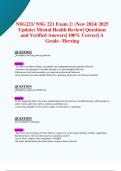NSG221/ NSG 221 Exam 2: (New 2024/ 2025
Update) Mental Health Review| Questions
and Verified Answers| 100% Correct| A
Grade– Herzing
QUESTION
Workplace bullying and regulations
Answer:
-A code of conduct outlines acceptable and inappropriate/unacceptable behavior
-A process for managers to handle disruptive or unacceptable behavior
-Education of all team members on expected professional behavior
-Zero tolerance for unacceptable behaviors, meaning all persons are held accountable
QUESTION
Managing Aggressive Behavior
Answer:
In the triggering phase, the nurse should approach the client in a nonthreatening, calm manner in
order to deescalate the client's emotions and behaviors
-conveying empathy for the client's anger or frustration is important
QUESTION
De-escalation techniques
Answer:
-the nurse can encourage for the client to express his or her angry feeling verbally, suggesting
that the client is still in control and can maintain control
-use of clear, simple, short statements is helpful
-the nurse should allow the client time to express him or herself
,-the nurse can suggest that the client go to a quiet area or may get assistance to move other
clients to decrease stimulation
-medications (PRN, or as needed) should be offered if ordered
-as the client's anger subsides, the nurse can help the client use relaxation techniques and look at
ways to solve any problem or conflict that may exist
-physical activity, such as walking may also help the client to relax and become calmer
QUESTION
What if the de-escalation techniques are unsuccessful?
Answer:
the client will progress to the escalation phase and the nurse must take control of the situation
QUESTION
Nursing process working with patients with anger problems
Answer:
-Assessment and effective interventions with angry or hostile clients can often prevent
aggressive episodes.
-Early assessment, judicious use of medications, and verbal interactions with the angry client can
often prevent anger from escalating into physical aggression
QUESTION
Expected outcome for aggressive clients may include
Answer:
-the client will not harm or threaten others
-the client will refrain from behaviors that are intimidating or frightening to others
-the client will describe his or her feeling and concerns without aggression
-the client will comply with treatment
QUESTION
Nursing Care Plan: Aggressive Behavior: Expected Outcomes-Immediate
, Answer:
· Refrain from harming others or destroying property throughout hospitalization
· Be free of self-inflicted harm throughout hospitalization
· Demonstrate decreased acting-out behavior within 12 to 24 hours
· Experience decreased restlessness or agitation within 24 to 48 hours
· Experience decreased fear, anxiety, or hostility within 2 to 3 days
QUESTION
Stages of Escalation
Answer:
1. Triggering
2. Escalations
3. Crisis
4. Recovery
5. Postcrisis
QUESTION
Stages of Escalation: Triggering
Answer:
An event or circumstances in the environment initiates the client's response, which is often
anger or hostility. Restlessness, anxiety, irritability, pacing, muscle tension, rapid breathing,
perspiration, loud voice, anger
QUESTION
Stages of Escalation: Escalation
Answer:
The client's responses represent escalating behaviors that indicate movement toward a loss of
control. Pale or flushed face, yelling, swearing, agitation, threatening, demanding, clenched fists,
threatening gestures, hostility, loss of ability to solve the problem or think clearly




